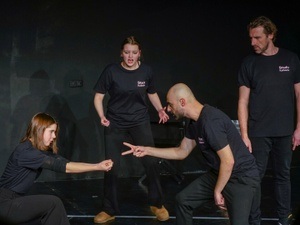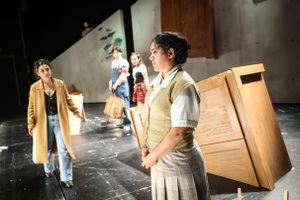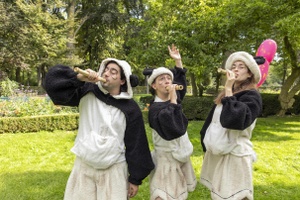caner teker: killjoy
In the organizer's words:
The word "killjoy" refers not only to the concept of "joy", but also to the act of disturbing and questioning. This tension between joy and disruption leads caner teker to a profound examination of grief as a physical experience. In "killjoy", grief is not only presented as an emotional experience, but also embodied through physical intensity and martial arts.
caner teker, together with Élie Autin and Julia Plawgo, uses the body as a tool to reveal the often hidden facets of grief. The performance questions how the physical expression of loss influences emotional processes and makes them visible. The black box theater space becomes a place where the boundaries between performer and audience are blurred.
Here, grief is not only observed, but experienced - as a physical confrontation and emotional journey. "killjoy" creates a space in which the complexity of grief can be experienced, reflected upon and shared in all its nuances. The performance unfolds a power that goes far beyond words, revealing the profound connection between physical expression and emotional experience.
"For killjoy, I explore the connection between work and grief through the figure of the "Moira": lamenting women who, as professional mourners, express and embody the pain of the bereaved. In doing so, I look at areas of the "service economy", emotional labor, migrant labor and performative work, including autobiographical references. My own perspective as a German-Turkish person and my memories of my grandmother's ritual farewell broaden my research." -caner teker
caner teker (Düsseldorf), born in 1994 in Duisburg-Marxloh, is a survivor, supporter and choreographer. caner teker completed a master's degree at the Kunstakademie Düsseldorf and studied at the SNDO - School for New Dance Development, Amsterdam. caner teker's work deals with the intertwining of identity, work and post-migration in the context of her personal experience as a German-Turkish woman* and the stories of her own family. In 2020, caner teker received the Förderpreis für Bildende Künste of the City of Düsseldorf and was a Guest Fellow at PACT Zollverein. caner teker has shown performances at Kunstverein für die Rheinlande und Westfalen, Düsseldorf, Les Urbaines, Lausanne, Julia Stoschek Collection, Berlin and Atonal Berlin, among others. The performance karadeniz was premiered in 2021 at tanzhaus nrw and HAU-Hebbel am Ufer, Berlin. 2022 caner danceWEB was a scholarship holder and performed at the Neue Nationalgalerie Berlin, Haus der Kunst Munich and Tanzquartier Wien. In 2023/24 caner teker was awarded the Ars Viva Prize and the purchase prize of the Museum Ostwall in Dortmund.
Duration: 60 min.
| Sat 16.11. | followed by a talk in the foyer |
Note: The performance uses loud music, fog and fake blood.
This content has been machine translated.













